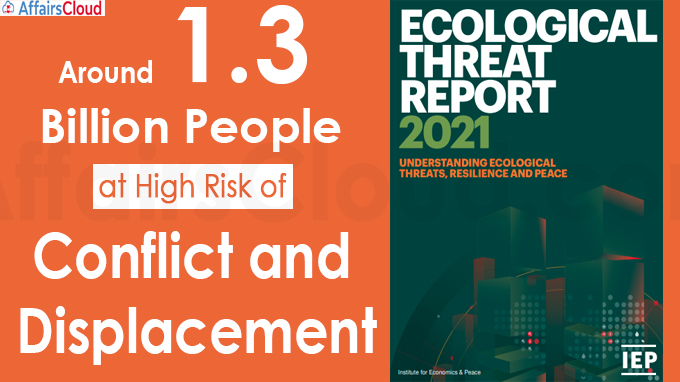 On October 7, 2021, the 2nd edition of ‘Ecological Threat Report (ETR) 2021: Understanding ecological threats, resilience and peace’ was released by the Institute of Economics and Peace (IEP). As per it, around 1.26 billion people across 30 countries are suffering from both extreme ecological risk and low levels of resilience.
On October 7, 2021, the 2nd edition of ‘Ecological Threat Report (ETR) 2021: Understanding ecological threats, resilience and peace’ was released by the Institute of Economics and Peace (IEP). As per it, around 1.26 billion people across 30 countries are suffering from both extreme ecological risk and low levels of resilience.
- The 11 countries with the worst ETR score are Afghanistan, Niger, Madagascar, Malawi, Rwanda, Burundi, Guatemala, Mozambique, Pakistan, Angola and Yemen.
What is in the report?
The ETR 2021 has assessed data from over 2,500 sub-national administrative units in 178 countries. It was related to food risk, water risk, rapid population growth, temperature anomalies and natural disasters.
- Of the 178 countries in the ETR, 30 were identified as hotspots for having low levels of resilience and a medium to extremely high catastrophic threat score. 13 faced extremely high and 34 others faced high ecological threats.
- The most vulnerable countries are in the Middle East and North Africa, sub-Saharan Africa, and South Asia.
- As a region, South Asia is the worst-placed, with water and food risks.
Key findings of the report are:
i.Global food insecurity has increased by 44% since 2014, affecting 30.4% of the world’s population in 2020. It is likely to rise further.
ii.From 1990 to 2020, a total of 10,320 natural disasters occurred globally with flooding being the common natural disasters accounting 42%.
iii.In 2020, 177 countries and territories recorded a warmer average temperature in comparison to the previous average temperatures.
iv.11 countries are projected to double their population between 2021 and 2050. They are all in sub-Saharan Africa.
- The three countries with the largest projected increases in population are Niger (161%), Angola (128%) and Somalia (113%).
v.By 2050 the global demand for food is expected to increase by 50%.
vi.By 2040 over 5.4 billion people will live in countries facing extreme water stress.
- Lebanon and Jordan will face maximum risk.
Recommendation:
To combine health, food, water, refugee relief, finance, agricultural and business development into one integrated agency in high-risk areas and empowering local communities.
Recent Related News:
In September 2021, International Labour Organization (ILO) released its flagship report on social protection named ‘World Social Protection Report 2020-22: Social protection at the crossroads – in pursuit of a better future’. As per the report, half of the global population i.e. 53 percent (4.1 billion) did not have any kind of social security.
About Institute for Economics and Peace (IEP):
Founder & Executive Chairman– Steve Killelea
Headquarters– Sydney, Australia




